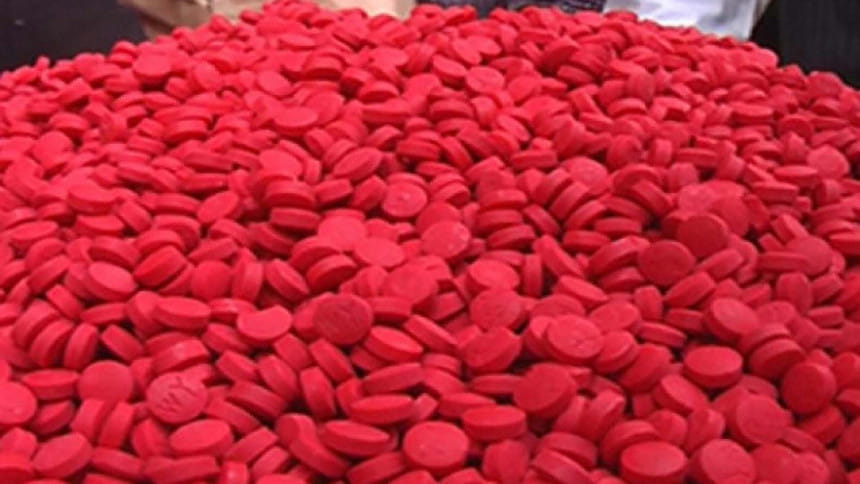Yaba glut menacing the city


It was close to 10:00pm on April 11. As usual, people were busy buying daily commodities from shops at the capital's Mohammadpur Geneva Camp.
This correspondent, posing as a buyer, was walking around there.
Within three to four minutes, a 25-year-old skinny youth appeared from an alley, and asked "Mama, how many [yaba] do you want?"
As this correspondent wanted to know the price of two big-sized yaba pills, he demanded Tk 400 for them.
After a little bargaining, he lowered his price to Tk 250, saying it was his last offer.
For obvious reasons, this correspondent refused the offer saying that "the price is still high".
The Daily Star has visited at least five spots in the capital over the last couple of weeks and learnt that the flow of yaba, a popular and highly-addictive drug, has increased significantly recently.
Besides the Geneva Camp, the four other spots are the capital's Karwan Bazar railway tracks; near the FDC gate of south Begunbari; Gudaraghat of Mirpur-1; and near the Ceramic Gate in Pallabi section-12.
During the visits, this newspaper managed to talk to at least three community leaders, two drug peddlers, and two buyers, who confirmed the recent surge in supply.
Law enforcement agencies have attributed the surge and price drop to increased production of the drug in Myanmar under the patronisation of its junta government, a claim supported by reports published in international media.
Last month, the UN said law enforcement agencies across Southeast and East Asia netted nearly 172 tonnes of methamphetamine, the ingredient of yaba, in 2021 -- about seven times more than a decade ago.
The surge in supply has sent street prices in Thailand and Malaysia crashing to all-time lows, according to international media reports.
The reports said the Myanmar junta is protecting large-scale drug production to ensure stability in conflict zones as it faces a revolt against the 2021 coup.
This includes Shan state, Southeast Asia's primary source of methamphetamine, according to the United Nations.
The reports correspond with the recent price drop in Bangladesh.
While visiting the Kawran Bazar railway tracks on Monday night, this correspondent met a yaba user who works at a nearby kitchen market.
"I have been taking the pills since 2012. At first, the price was around Tk 300, but now I can buy it for only Tk 150. It has become cheaper recently," the person said.
Humayun Kabir Khondakar, deputy director of the Department of Narcotic Control (DNC), admitted the surge in supply and price drop.
Khondakar, who has conducted research on yaba for the last two years, said the flow started to increase after the Myanmar military took over power in February 2021 and started patronising yaba production.
Khondakar conducted his research with the assistance of 120 yaba users from different rehab centres, 180 officials of law enforcement agencies, and dozens of yaba dealers in Cox's Bazar.
His research found that Myanmar state patronage has halved the production cost of yaba.
Just two years ago, the production cost of a pill was 1,000 Myanmar Kyat, equivalent to Tk 50. It is now less than 500 Myanmar Kyat, said Khandakar, citing his findings.
A piece of yaba can be had for only Tk 25 at the Rohingya camps, he added.
This correspondent, while talking to addicts and traders, learnt that the current slump in price in the capital came around two months ago.
Users and traders said the retail price for a small-sized yaba is now Tk 70 to Tk 80, which was Tk 120 just two months ago.
Asked, a drug trader in the Geneva Camp said the price dropped as a huge number of pills have flooded the market.
Another trader said the drug is now being sold online increasingly, and users can have home deliveries. It all makes the spread of the drug ominously easier.
"For home delivery, the drug dealer always sends female carriers to evade law enforcers," he said.
Asked about the supply surge, Md Mehedi Hasan, assistant director of the Department of Narcotic Control, said the seizure of yaba tripled in recent months.
"We used to seize around 10 to 20 thousand pills a month just a year ago, but it now rose to 50 to 60 thousand pills," he said.
"We have increased our vigilance. We are conducting drives analyzing technical data resulting in the detection of more consignments," added Mehedi.
Officials and experts say only eight to 10 percent of total smuggled narcotics are seized by law enforcers. The rest, around 90 percent, flood the market.
Usually when smuggling increases so do seizures, they say.
According to the annual drug report of Bangladesh 2022 published by DNC, all agencies have seized around 21.66 crore yaba pills in the last five years.
According to the DMP database, 3,675 narcotics cases were filed and around 5,022 people were arrested in the first three months of this year.
During this period, police recovered 1.20 crore yaba pills along with other drugs, the DMP data added.
Despite the government's "zero tolerance" policy on yaba smuggling, Bangladesh remains South Asia's biggest destination for yaba with a market estimated to be more than $3 billion, reports Reuters.
Though there is no solid data available on the number of users in the country, law enforcers on several occasions in the past estimated it between 7.5-8 million.
The drug can provide temporary happiness to its users. But in long run, it destroys its abusers both psychologically and physically. It causes anxiety and aggression and damages the kidneys, heart, liver and brain as well. Overdose can even cause death.
Sources say the majority of the yaba consignments are entering the country through different points in Teknaf and Cox's Bazar. After entering the country, the yaba consignments are first stored at the Rohingya camps. From there, those are smuggled to different parts of the country.
The drug smugglers are using ingenious ways for transferring yaba and mainly using poor women and children as drug mules to avoid suspicion and arrests, according to sources at the Rohingya camps.
Contacted, Md Faruk Ahamed, assistant superintendent of police (ops and media) of the Armed Police Battalion (APBn-8), said they are on alert and conducting regular drives in the Rohingya camps.
AKM Shahidul Hoque, former inspector general of police, told this newspaper that, without a "holistic approach", only law enforcers' efforts won't stop the narcotics supply.
"It is a profitable business that need little investment. So, people are risking their lives for it," he said.
He stressed the need for arrests of narcotic ringleaders for ebbing the flow of drugs but also explained the difficulty of law enforcers in this regard.
"The total business is run in a cut-out strategy. It runs using some signals or code words. No carrier or smugglers have any idea of the whole racket. For this reason, the masterminds always remain untouched and only the carriers get arrested," the retired police chief said.
Contacted, Md Mahfuzul Islam, superintendent of police of Cox's Bazar, said they have no specific information about the alleged surge in the supply of yaba.
Asked what actions are police taking to tackle the situation, Md Monzur Rahman, assistant inspector general of police headquarters, said, "We are conducting regular drives against narcotics. Besides, we often conduct special drives whenever we find it necessary."
Lt Col Md Mohiuddin Ahmed, commander of the Border Guard of Bangladesh (BGB-2), told The Daily Star that the border protection force is on alert and conducting drives. "We have recovered around six lakh yaba pills last month," he added.
Dr Tawohidul Haque, assistant professor at Dhaka University's Institute of Social Welfare and Research, said the supply surge of yaba poses a great threat to the country's youth, the main workforce of the country.
"If the drug spreads throughout the country unchecked, the young men and women risk losing their working capabilities. Instead of contributing to the country, they may become a burden," he said.
He said the law enforcers need to put their words into action, or else, things will go out of control.
Tanvir Momtaz, director (operation & intelligence) of the DNC, said DNC is holding talks with the neighbouring country to find a solution to the crisis.


 For all latest news, follow The Daily Star's Google News channel.
For all latest news, follow The Daily Star's Google News channel. 


Comments